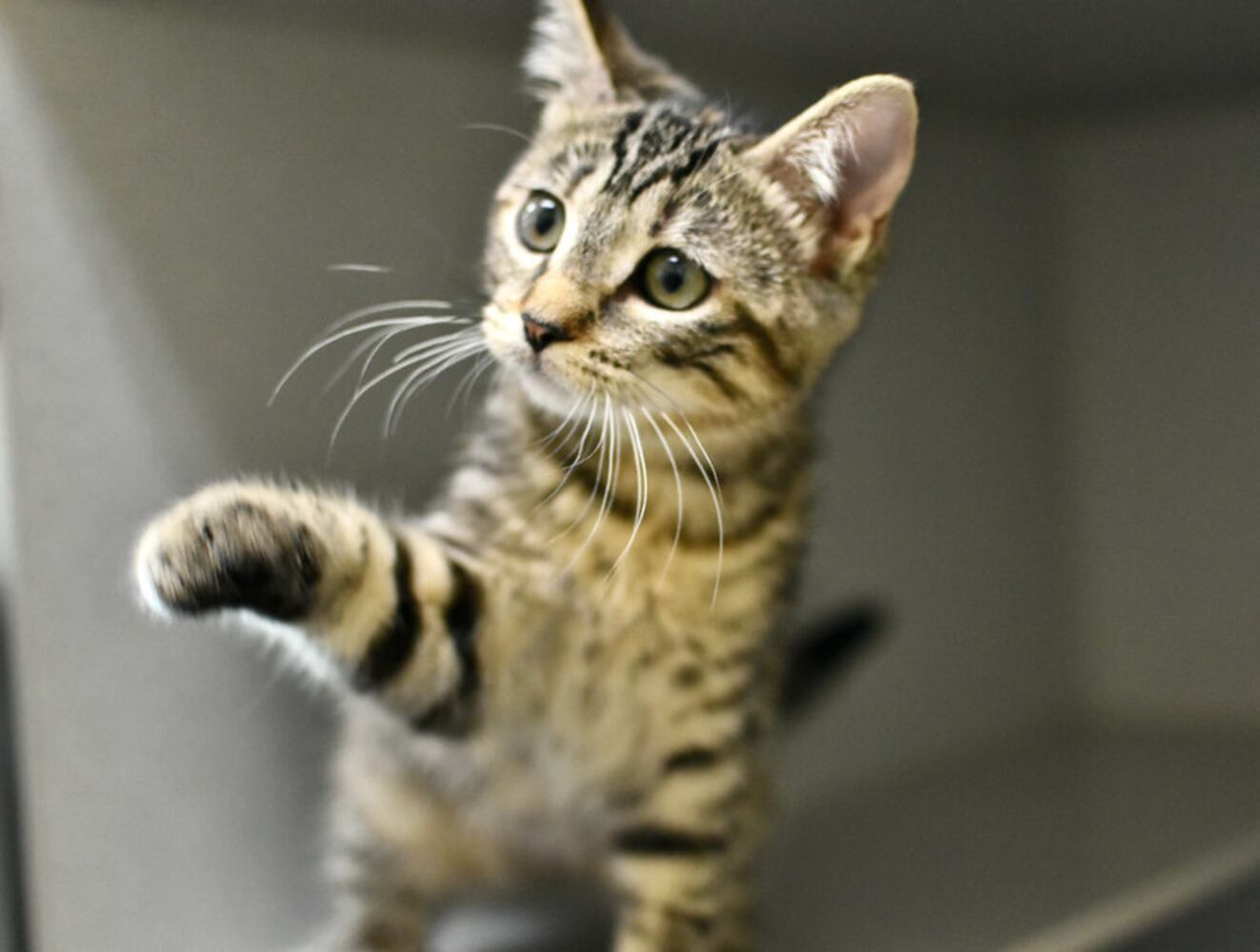A steady chorus of barks and howls greets you in the parking lot, an audible reminder of the thousands of cats and dogs brought to the Cobb County Animal Services shelter each year.
Some of them are strays found wandering the streets alone. Others are family pets surrendered by their owners.
After a slowdown in 2020, the number of animals housed at the Marietta shelter has picked back up in recent months. But animal adoptions are down across metro Atlanta, and many shelters are running out of space to house the potential pets.
“I mean, if you would’ve come here last month, you would’ve seen kittens up and down the hallway,” Cobb County Animal Services shelter operations manager Jacob Arnold told an AJC reporter during a recent tour of of the facility.
August was the culmination of a fruitful kitten season, the time of year when cats typically reproduce the most. The Cobb shelter saw its numbers peak to nearly 400 animals over the summer.
The shelter could not find homes for the furry friends quickly enough, leading to overcrowding. Some of the cats had remained for over 160 days and Cobb County Animals Services isn’t a no-kill shelter.
Running out of space and fearing the worst, the shelter reduced the fees it charges for adoptions and put out a bulletin asking local animal rescue groups to pull cats from the facility.
“When we get to capacity, which is around 400 animals, it gets difficult because there’s a finite amount of space,” Arnold said. “So we try our best to do adoption specials and work with rescue groups to get them to adopt.”
The request for help worked. Cobb was able to remove 241 cats through adoptions and rescues in September. That’s the single largest month for the shelter since before the pandemic began, according to Arnold.
The Good Mews Animal Foundation in Marietta rescued 12 cats from the shelter for adoption in September. They took another 10 feral cats into their trap-neuter-return program.
“It’s the best feeling in the world to know that you are saving not only the life of a cat, but you’re also helping these shelter workers out,” Good Mews Vice President Elizabeth Finch said. “Because when you have these workers in an environment that does have to euthanize for time and space, it’s very, very taxing on their mental well-being.”
This month, the shelter is focusing on reducing its number of dogs, specifically breeds that weigh 40 pounds or more. Some of them have languished in the canine clink for months.
“It’s those larger-breed dogs that we’re trying to highlight this month that are harder to find homes for,” said Arnold.
Cobb County is not alone. Fulton County Animal Services is also at a critical space crunch. Kennels are full and some animals are getting sick. The facility was expected to surpass its maximum capacity of 300 animals soon.
LifeLine Animal Project, Georgia’s largest animal welfare organization, manages both Fulton and DeKalb’s county shelters. The nonprofit is asking more families to adopt animals to alleviate the overcrowding in both counties. LifeLine will also be hosting an Oct. 23 open house to recruit more foster families at the DeKalb and Fulton County shelters as well as its Atlanta clinic.
“We’re trying to do everything we can right now to get the animals out, but it’s hard,” LifeLine spokeswoman Karen Hirsch said. “I know at our Fulton shelter, we’re having to house four to a run and double up at our DeKalb shelter. So it is a difficult time.”
It might be difficult to find families interested in adoption. Atlanta Humane Society Communications Director Christina Hill said they’ve seen an increase in pet owners who’ve had to surrender them this year for financial reasons or as a fallout from the pandemic.
“We’ve had people whose family members died of COVID and they’re no longer here for their pet,” she said. “We’ve seen family members whose mom has gotten sick from COVID and they’re experiencing long-term effects, and they’re not able to care for their pet. Just people in general struggling to keep their pets.”
According to Shelter Animals Count, an organization that analyzes animal welfare data across the nation, there were 25% less shelter intakes in 2020. The report, released Sept. 29, showed that euthanasia — the killing of shelter animals — dropped about 54% through the first six months of 2021 compared against pre-pandemic levels.
That decrease was largely due to the fact that there were fewer animals at most shelters. But the pandemic doldrums ended during the recent summer months. Many metro Atlanta shelters directors reported a rapid influx of cats and dogs that pushed their intake levels close to the norms of 2019.
Fraily Rodriguez, a director of lifesaving for Best Friends Animal Society, which has shelters in Atlanta and throughout the nation, said the number of cats and dogs being adopted, rescued and transported from shelters hasn’t kept pace with the amount of incoming animals.
“You’re starting to see the normalization of our culture again. That, on top of a shortage of staff members, has been a huge stressor,” he said.
American Humane estimates that 56% of dogs and 71% of cats entering animal shelters across the nation are euthanized. Cats get put down at a higher rate because they are more likely to arrive without owner identification. The Gwinnett, Fulton and DeKalb county facilities are considered “no-kill” shelters, meaning they save at least 90% of the animals they take in.
Rescue workers say the key to boosting the survival rate of animals in shelters is owners keeping their pets microchipped, and more volunteers stepping up to foster homeless animals.
Cobb County has operated just beneath the 90% no-kill threshold for the past two years, hovering around 85% live releases in 2019 and 2020, according to county records obtained by AJC.
Furkids, one of Georgia’s largest no-kill rescue shelters, has pulled about 300 animals from the Cobb County shelter so far this year. In July, they rescued 48 cats that had been exposed to panleukopenia, a highly contagious viral disease that can cause the deadly feline parvovirus. Furkids quarantined the exposed animals and prepared them for adoption when tests showed none of them were infected.
“We really see Cobb County Animal Control as the next large county that can get to a no-kill status,” Furkids CEO and Founder Samantha Shelton said. “We have intentionally focused on pulling cats, especially from Cobb County.”
About the Author
Keep Reading
The Latest
Featured


